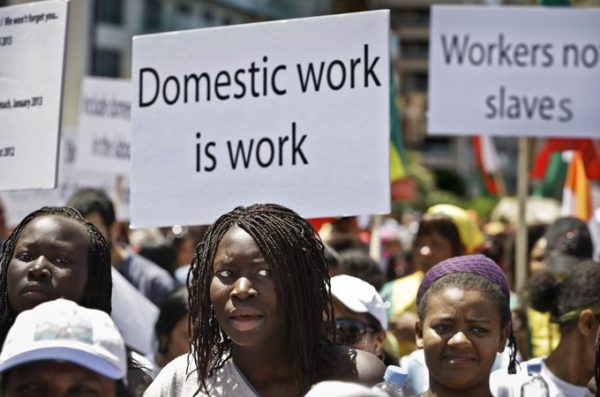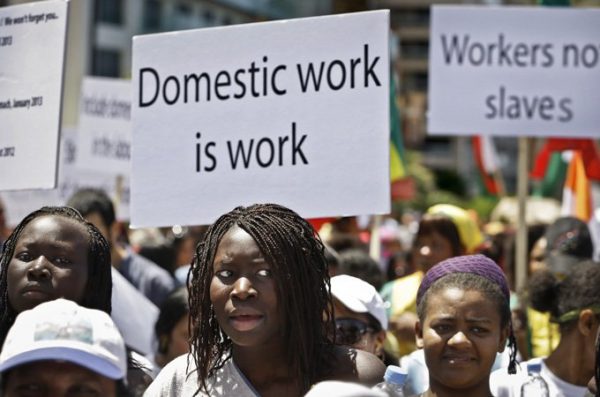
The infelicitous ‘sad truth’ of our unsung African heroines hired as domestic workers still face ‘abuse and fraud’ who are marooned in the Gulf countries – deprived of freedom, human dignity and the money they moved abroad for – is instructive.
The fabulosity of our African women should be aware that their pursuit for a better life must always be conducted in the most circumspect manner lest it ends in pain and tears, like some women who are in bondage in Kuwait, Saudi Arabia, Qatari and possibly other countries not only in the Persian Gulf but elsewhere.
The prevailing economic hardships are forcing a respectable number of hard working women to look abroad for a better life, but some end up worse off than they were at home. These domestic workers will always find an alternative plan – we see many of them actively seeking jobs in the oil-rich Gulf region. Bahrain, Saudi Arabia, United Arab Emirates, Kuwait and Qatar have become choice destinations for skilled and unskilled personnel alike. It is inhospitably hot in the Arabian Desert – up to 48 degrees Celsius in summer at low elevation – but these maids are attracted by the promise of many job opportunities and high salaries.
It doesn’t always end well for some. There are stories that some these maidservants are left exposed to sexual exploitation, extremely harsh working conditions under which the promised hefty salaries don’t come, food is scarce, and the average working day is 20 hours. In a conservative country where women are not allowed to walk alone and without papers, those abused domestic workers stand the risk of arrest and police harassment.
There is such a massive failure in African diplomacy here. But will African governments listen?
In 1945, somewhere far off on a boat in the middle of the sea, a secret meeting was held between Saudi Arabia’s King Abdulaziz and US President, Franklin Roosevelt. The King said– I’ve got lots of oil, and you need it. Roosevelt said– And we’ve got lots of military power, you need it. And there started that “special” relationship, a pact still in operation: oil for security. Saudi grew rich and powerful and never suffered that oil/resource curse that comes with local people being impoverished, displaced or killed off because of poorly negotiated deals between greedy and myopic politicians and powerful countries.

Africa is a weak militarily but obviously has labor resources Saudis need. Saudi Arabia is a laugh, like a fly wagging a finger at a fly swatter. Railing against the depraved Saudi masters on social media won’t work either. Evil is evil. Africa need some smart diplomacy to build labor transfer programs that protect and benefit African citizens looking for employment abroad in places they are needed. Aren’t we tired of our people being enslaved all the time when we have the smarts to prevent it? We just lack political will.
Domestic workers are often forced to do jobs that are not stipulated in the contract. In November 2015, the Saudi Labor Ministry amended the labor law to prohibit employers from confiscating passports and failing to pay salaries on time. However, not much has changed.
According to the Human Rights Watch Organization, Saudi Arabia operates under kafala (visa sponsorship) system that ties a migrant worker’s visa to their employers or sponsors. This gives the sponsors excessive control over the employees and leeway to abuse them. So, what happens if a domestic worker dies in Saudi Arabia?
For instance, the sponsor can confiscate the worker’s passport and could fail to pay salaries on time or fail to provide copies of the contract to the employee.
Although other governments banned recruitment agencies from recruiting domestic workers to the Middle East, this ban does not include those offering professional labor in banking, financial, health and oil sectors. Despite the ban, thousands of women still fall prey to unscrupulous agents.
The process of going to Saudi Arabia usually involves four parties: the local agency, the domestic worker, a recruiting company based in Saudi Arabia and an employer or a sponsor who is looking to hire.
The employer or sponsor approaches the Saudi recruiting agency for a domestic worker which, in turn, contacts the local agency. Often, there is usually a fifth party — a broker — who introduces the domestic workers to the local recruiting agency, at a fee.
There are estimates of thousands of African domestic workers living in Saudi Arabia alone. About 70 per cent of these are domestic workers as part of the hidden migrant workers whom the United Nation’s International Labor Organization says are likely to face abuse and exploitation in their place of work.
A United Nations report released earlier this month warned that more needed to be done to prevent the exploitation and abuse of domestic workers in the Middle East.
The “implementation and enforcement remain major challenges and continuing and credible allegations of abuse and fraudulent behavior continue to plague the sector”, the International Labor Organization (ILO), a UN agency, report said.
ILO estimated that nearly one in five of the world’s migrant domestic workers live in the Middle East, a total of 3.16 million people of which 1.6 are women — although the organization claims that may be a conservative estimate.
“Important progress has been made over the last few years by a number of countries in the Middle East towards legislative change to protect migrant workers,” the ILO report read.
“Yet implementation and enforcement remain major challenges and continuing and credible allegations of abuse and fraudulent behavior continue to plague the sector.”
According to the organization, existing laws are often not followed, pointing to its survey of employer attitudes in Lebanon, Jordan and Kuwait, where it says there is “a significant degree of misinformation and noncompliance with existing laws and regulations”.
“The studies also revealed tensions between the expectations of workers and employers, and mismatches of skills, which remain largely unaddressed,” the report continued.
The organization said it would support governments in reforming the system.
The Ministry of Labor and Social Development has acknowledged the kingdom has problems with workers’ rights, but the Government has also often said Islamic law ensured protection for both Muslims and non-Muslims and reminded foreigners they were guests in the country.
The Ministry has urged people not to get involved in ads selling or leasing the services of domestic workers on social media by unlicensed authorities or individuals. It said it is monitoring such violations and transferring them to competent authorities for punishment.






Black suffering in the eyes of non-blacks is an acceptable phenomenon because, it’s believed that we are physically, biological and psychologically resistant to pain.
So subjecting black people to servitude is what the world is built upon, continues to survive and feed on. Whites, Asians, Arabs and the in-betweens all see nothing to respect and care about in blackness.
For close to two thousand years and still counting, the practice of enslaving blacks was never abated talk less of abolition. The practice always and constantly metamorphizes into other forms. The results are but always the same. Unimaginable suffering of our people over whose bleeding and death we only shed a few tears and pretend to be moving on. Then the history got written by white people who has no understanding of and about the black condition. And WE are forced to believe and digest the lies “whitely” narrated. The saddest part is yet to come, brace yourself! Our “elites” believe in those historic misrepresentations and go on to teach it to us, turning successive generations of young people into self haters who look low upon anything African and anything black. Again we the masses turn to our best weapon: SILENCE.
Yours in the service of The Gambia and Africa, I remain.
Alagi built a compound, but did not secure it with a solid gate to protect his wife and children, because he ran out of money. Alagi ran out of money because he is an irresponsible husband and father who spent the money put aside to protect his family, drinking alcohol and consorting with prostitutes. One day Alagi’s wife took matters in her own hands and went to find a job cleaning for Mr Buzza the wealthy Lebanese business owner in Bijilo. He beat her and raped her repeatedly. Tell me who is to blame. Just a question. That’s all.
This is what irresponsible leadership and followership does to a people. Don’t get it twisted, as pointed out, the suffering endured by our brothers and sisters in the hands of these savages is unimaginable, but lets discuss how we got here and what we need to do to get out of here. Lets focus on what we have control over. What we as a people must do to end this suffering.
God Bless our Unsung African Heroine.
DR, I agree, very sad, but I must also play “devil’s advocate”:-
Did you Dr, ever hear of a Gambia MAYOR who is said to have impregnated up to 20 young girls, with total impunity, while in office? Just wondering.
Subhanala
DEVILS WORK Yorro, nothing to do with Allah’s Glory.
How we get here in the first place is what I have already given you a synopsis of. You postulation that the flaws of a patriarch society is what got us here and is what is hindering us from empowering the individual to excel and developing as a people is shaky at best.
I have heard such arguments all the time from the liberal schooled western educated Africans and black people in general. What they fail to take into cognizance is that the various discourses over principles of supply and demand as it is, were never and will never be devoid of the big elephant in the room: RACE!
We have been ignoring that for a very long time at our own peril. Now let’s talk from your perspective on how do we get out of our dilemma.
Yours in the service of The Gambia and Africa, I remain.